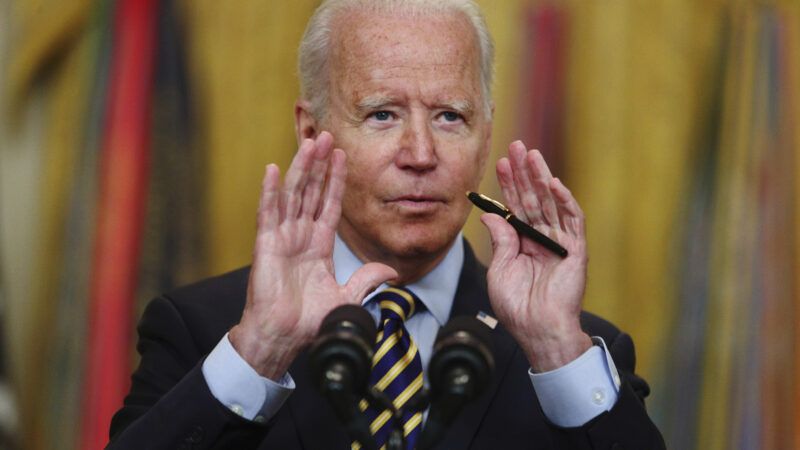Joe Biden's Executive Order on 'Promoting Competition' Covers Everything From Farmers Markets to Net Neutrality
Plus: Treating social media platforms as common carriers, Norway criminalizes sneaky influencer editing, and more...

Biden attempts to substitute presidential power for the legislative process again. A new White House antitrust order exemplifies one of the worst presidential trends: a proclivity for unilateral executive action, even when Congress is on the cusp of considering the same thing.
Both the U.S. Senate and House of Representatives have been considering a slew of changes to American antitrust policy. There are a lot of reasons to be wary of these measures, but at least—should they pass—they'll have been the subject of deliberation and voting by elected officials. In contrast, President Joe Biden's new "Executive Order on Promoting Competition in the American Economy" simply tells federal agencies to make a slew of changes in line with the president's values.
The good news is that—like so many of former President Donald Trump's executive orders—Biden is wading into territory he doesn't actually have the power to control and, therefore, much of his executive bloviating is technically toothless. There's a lot of the word encourages thrown about. The bad news is that presidential encouragement to federal agencies still has a way of becoming bureaucratic policy.
Not all of the encouragement is bad. For instance, Biden "encourages the [Federal Trade Commission (FTC)] to ban unnecessary occupational licensing restrictions that impede economic mobility." This is one area where U.S. antitrust policy does have a lot of room for improvement.
Another bit of positive encouragement: Biden is directing the Department of Health and Human Services "to consider issuing proposed rules within 120 days for allowing hearing aids to be sold over the counter."
It also touches on "right to repair" rules, encouraging the FTC to limit "equipment manufacturers from restricting people's ability to use independent repair shops or do DIY repairs—such as when tractor companies block farmers from repairing their own tractors" and to "issue rules against anticompetitive restrictions on using independent repair shops or doing DIY repairs of your own devices and equipment."
But Biden also urges more burdensome meddling in private business practices and more aggressive federal involvement in many aspects of U.S. markets. For instance, the order "encourages the FTC to ban or limit non-compete agreements" and to establish new rules on internet user data. He encourages the Federal Communications Commission (FCC) to restore net neutrality rules, to ban landlords from making deals with internet service providers that say tenants must choose a particular internet service, and to create a "nutrition label" for internet service. He orders the U.S. Department of Agriculture (USDA) to support farmers markets, and further "directs USDA to consider issuing new rules defining when meat can bear 'Product of USA' labels" and to develop new labeling standards "so that consumers can choose to buy products that treat farmers fairly."
He also announces a general "policy of greater scrutiny of mergers, especially by dominant internet platforms, with particular attention to the acquisition of nascent competitors, serial mergers, the accumulation of data, competition by 'free' products, and the effect on user privacy."
The White House will establish a new Competition Council, led by the director of the National Economic Council, "to monitor progress on finalizing the initiatives." You can read more about them here.
Here's a good thread parsing the order:
Today President Biden will issue an executive order on"Promoting Competition in the American Economy", I'll save the conversation about doing this action by EO for reg experts like my @aaf colleagues @DtheGman and @Dan_Bosch but some early thoughts on what's known to be in it
— Jennifer Huddleston (@jrhuddles) July 9, 2021
Among other things, Jennifer Huddleston, director of technology and innovation policy at the American Action Forum, highlights evidence that contradicts Biden's claims about increased concentration in U.S. markets.
FREE MINDS
UCLA law professor Eugene Volokh wades into the social media/common carrier debate:
[Eugene Volokh] The First Amendment and Treating Social Media Platforms as Common Carriers https://t.co/LKW9rQwBxf
— Volokh Conspiracy (@VolokhC) July 9, 2021
FREE MARKETS
Truth in influencer-ing. In Norway, a new amendment to the country's Marketing Act means that "Instagram influencers who don't clearly state if they've edited photos which are advertisements could be fined or imprisoned," the New York Post reports.
The law also applies to ad posts on other social media platforms like Facebook, TikTok, Twitter and Snapchat….
A new label designed by the Norwegian Ministry of Children and Family Affairs will have to be added to advertisement posts that have altered someone's shape, size or skin.
This would include an influencer advertising a protect but making their lips bigger, enhancing muscles or making themselves look slimmer or bigger in certain areas.
QUICK HITS
• How the U.S. is screwing over Afghan interpreters and contractors in other roles who helped us for years.
• The FBI is investigating Texas' "bachelor party" prostitution stings. (More on those here.)
• Sen. Elizabeth Warren (D–Mass.) wants to crack down on cryptocurrency.
• Antiquated zoning laws are worsening the housing crisis, argues Steven Greenhut.
